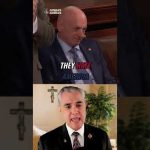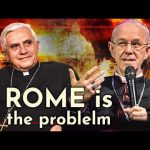On October 31, Pope Francis appointed Monsignor Hugo Basabe as Archbishop of Coro, Venezuela.
Episcopal appointments in Venezuela are not usually headline news, but a series of strange circumstances make this appointment quite peculiar.
Since 2017, Monsignor Víctor Hugo Basabe, 62, has been the bishop of San Felipe, a small diocese in the central western region of the country. Since 2020, he has also served as apostolic administrator of Barquisimeto—the fourth largest archdiocese in the country, after Caracas, Maracaibo, and Valencia.
It was generally believed that Basabe had not been officially named archbishop of Barquisimeto because the Venezuelan regime had not given him the placet required by the agreement which regulates Church-State relations in Venezuela, largely because the bishop is known for being a vocal opponent of the dictatorship of Nicolás Maduro.
The fact that he is now appointed in the Archdiocese of Coro – which ranks as an archdiocese more for historical reasons than for its current size – is doubly odd, since the move creates a double vacancy in a country in which it is notoriously difficult for the Church to make appointments, due to the constant opposition of the Maduro regime.
So, could there be something more behind the appointment?
Typically, the appointment of an apostolic administrator is a temporary move, but in Venezuela it has become a way for Pope Francis to make the controversial episcopal appointments in the country.
A 1965 concordat between Venezuela and the Vatican requires that, before the appointment of a bishop in the country, the Holy See “shall send the candidate’s name to the President of the Republic, so that he may state whether he has any objections of a general political nature to oppose the appointment.”
“In case of such objections, the Holy See will indicate the name of another candidate.”
In simple terms, Nicolás Maduro has the right to refuse to accept the appointment of any diocesan bishop in Venezuela, but he cannot stop the appointment of apostolic administrators, who have the same powers as a bishop, even if it is a technically temporary appointment.
In Venezuela, “temporary” has become a flexible term. For example, Cardinal Baltazar Porras was apostolic administrator of Caracas for almost five years until he was officially named archbishop in January of this year.
Basabe had already served as apostolic administrator of Barquisimeto for three years before his appointment to Coro.
When he was appointed apostolic administrator of Barquisimeto, it was presumed that the pope wanted him to be the archbishop, but he did not obtain the placet of Maduro, so as had previously happened with Porras, he would remain in his position on a pro tem basis.
During his time leading the Archdiocese of Barquisimeto, Basabe is also speculated to have played a significant role in bringing order to the diocese of Carora, suffragan of Barquisimeto, where for years there were serious problems of priestly discipline.
Amid allegations of disobedience and violations of chastity in the diocese of Carora, Bishop Luis Armando Tineo Rivera suspended three priests, which led to almost half of the clergy of his diocese to accuse him of authoritarianism, classism and poor administration.
Tineo resigned in 2020 at the age of 72, officially for health reasons, and moved to Spain, but many believed he left because members of the clergy and faithful of the diocese presented strong opposition to his attempt to impose discipline and keep the diocese together.
After two years of apostolic administration by a retired archbishop, a Venezuelan Piarist priest who had been in Bolivia for 15 years and was auxiliary bishop of the Archdiocese of Cochabamba was then appointed bishop of Carora. It is believed that Basabe could have played a role in the appointment.
In January this year, Basabe attracted worldwide attention when he used his homily in the procession of the Divina Pastora — an event that normally brings together between 1 and 3 million people — to harshly criticize the dictatorship of Nicolás Maduro for its corruption, inattention to poverty, and the lack of freedom in the country. The homily earned him threats of imprisonment from Diosdado Cabello, number two in the Venezuelan regime.
With Basabe’s profile, influencing the suffragan dioceses of Barquisimeto and taking a lead as a critic of the Maduro dictatorship, and with his extensive pastoral experience in rural areas and deep theological training in Rome, many thought that Pope Francis would insist on keeping him in post as apostolic administrator of Barquisimeto until he could eventually be named archbishop.
Instead, Basabe’s appointment to Coro seems to many like a kind of demotion.
The Archdiocese of Coro is small for an archdiocese. It was the first diocese in South America, founded in 1531. However, it barely has 500,000 faithful and 39 parishes (almost the same as San Felipe, which Basabe previously led) and only a single suffragan diocese.
Barquisimeto, meanwhile, is the fourth largest diocese in the country with 1.1 million Catholics and four suffragan dioceses.
It’s a strange move, then, for a bishop with his profile.
There are several possible explanations.
The first could be that Francis may simply have gotten tired of waiting for the placet of the Maduro regime for Basabe to take formal charge in Barquisimeto, and the pope instead preferred to give him a permanent appointment, even if it meant in a smaller archdiocese.
However, this hypothesis has a complication: Basabe’s move leaves two vacant sees in Venezuela — including one of the largest archdioceses in the country. This is no small consideration in a country where filling an archdiocesan vacancy can be a struggle lasting several years, as Basabe and Cardinal Porras have demonstrated.
The appointment could also be interpreted as a sign of weakness on the part of the Holy See by Maduro, leaving the Venezuelan dictator tempted to continue withholding assent to any future candidates for the Barquisimeto archdiocese until he is offered a name he finds acceptable.
In fact, the scenario that has played out in Barquisimeto could be adopted by the government as a template strategy for the country’s crown jewel, the Archdiocese of Caracas. Cardinal Porras is already 79 years old, and the pope could finally accept his resignation at any time, leaving the archdiocese vacant.
In fact, 10 of the country’s 27 dioceses are led by bishops aged 72 or older, while the country’s third largest archdiocese, Valencia, has been vacant since the end of 2022.
All this could create a complicated situation for the Church in Venezuela.
Historically, beyond the anti-Catholic and revolutionary rhetoric, both Maduro and his predecessor, Hugo Chávez, have respected the vast majority of the Church’s episcopal appointments in the country. The situation with Basabe could be a sign that this implicit respect could be about to end, with Maduro insisting on greater influence in the composition of the Venezuelan episcopate in the coming years.
Another possible interpretation of recent events would need to consider the role that bishops have taken in critical areas of the country in the midst of the social debacle in Venezuela.
The regime of Nicolás Maduro has seen a near absolute loss of control in some regions of the country, especially border and coastal regions, where armed groups of different natures have taken over, including guerrillas, drug traffickers, armed gangs and illegal mining groups.
These groups are often better armed than the Venezuelan armed forces themselves, which is why they are able to effectively resist the authority of the Venezuelan State.
Strangely, though, there is an authority that these groups do usually recognize, or at least respect: the Church.
For this reason, in these regions, local bishops and parish priests have become informal authorities, mediating conflicts between the armed forces, the police and various irregular groups.
Beyond the anti-ecclesiastical rhetoric, the Venezuelan regime has seen the Church as an ally to mediate with these groups and reach, on occasions, an informal truce in which the local Church serves as interlocutor and mediator.
Basabe, known for his personal integrity and strong personality, could serve in this role in Coro, located in the state of Falcón, on the north-western border of Venezuela and a key stop on drug trafficking routes to the Caribbean islands and the United States.
In September, the armed forces arrested two men trying to transport 455 kilos of cocaine from Cabo San Román, in that state.
Although Basabe’s appointment publicly appears to be a demotion, it could actually mean he is being entrusted with the delicate task of mending relations between the local hierarchy and the Maduro dictatorship by serving as the local moral authority in the face of irregular armed groups in his diocese.
The real reasons for the appointment of Víctor Hugo Basabe to the Archdiocese of Coro will likely never be confirmed with certainty.
But the questions surrounding the decision demonstrate the complicated task facing Pope Francis and the Dicastery of Bishops in appointing bishops in Venezuela in the coming years.















